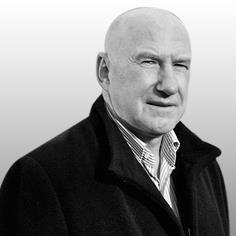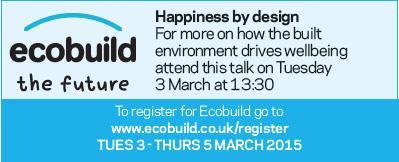A building that looks after your wellbeing - your fitness, comfort and stress levels - might sound like science fiction, but there are already awards in place applauding this kind of innovation

Two and a half thousand years ago Greek physicians were obliged to take the Hippocratic Oath which said, among other things: “I will take care that they suffer no hurt or damage.” This was summarised by Thomas Inman in the 19th century as “first, do no harm”. Perhaps other professions, from politicians to fast-food vendors, should have done the same.
If architects, engineers and constructors had taken their own Hippocratic Oath all those years ago, it could have served us well. In Article 25, the humanitarian charity I’m a founder trustee of, we know, for instance, that it was not the earthquake in Haiti that killed people, it was their poorly constructed buildings. The quake shook the concrete off the meagerly reinforced columns and the buildings failed in simultaneous collapse, killing almost everyone indoors. We will “build back better” using competent technology and “do no harm”. Similarly, in New Orleans and Bangladesh, it was not the river or flood tides that really killed people - it was how we built communities around the rivers and the sea, in flood plains or with inadequate levees.
But our buildings can go well beyond just not doing harm; they can be positive agents for wellbeing, and this is the future. Our buildings should look after us, keep us healthy and prolong our lives. In the past, caring employers might say to a prospective employee: “If you get ill, we’ll pay for the best physicians to fix you.” In the future (and the future is now), caring and intelligent employers will say: “Come and work with us, we’ll keep you healthy.”
There is even the first certified code in the US for a WELL Building Standard with silver, gold and platinum levels. It’s promoted by Delos, which was started eight years ago by a Goldman Sachs employee and is now supported by luminaries like Bill Clinton, Leonardo DiCaprio and Will.i.am. How cool is that? Pretty cool and a pretty serious business: there is money in keeping people well.
Our buildings can go well beyond just not doing harm; they can be positive agents for wellbeing. Our buildings should look after us, keep us healthy and prolong our lives
In truth, it’s an obvious proposition. We spend most of our lives in buildings, so they should be designed to look after us. Delos scores wellness, much like a LEED assessment, under different categories. For example: air, which should be filtered; water, which should be purified and dechlorinated; light, which might be daylight, daylight-mimicked or UV light to provide vitamin D; fitness, through the building encouraging movement, the use of stairs or including a gym; comfort, through the control of noise, electromagnetic fields, etc; and the mind, by reducing stress, providing plants and relaxation support.
Delos is first out of the blocks in quantifying wellness in a building, but this has a long way to go and there will be many other standards before we get it just right. We live in artificial environments with a soup of chemicals in the air and highly treated water. Years ago, sulphur, tar and smoke from our coal fires might have killed us off early, now it’s the chemicals oozing from the manmade materials that we live within. The West is also suffering an epidemic of obesity, so buildings that control our diet and encourage exercise will be doing us all a great favour.
“Well buildings” are completely in tune with what is happening elsewhere. Health foods and vitamin drinks are all the rage. Even I wear a fitness tracker wristband that monitors my exercise, sleep quality and diet, and sends the information to my family who all wear the same technology. My daughter nags the hell out of me. Later this year I might wear an Apple watch which will also monitor my heart rate and can send all my information to my GP who can build a better profile of me and prescribe more accurate remedies for my ails.
Not to be left out, Google has hired a medical researcher who thinks he can devise a drink with nanotechnology particles which will stick to diseased tissue to give accurate, early warning of cancers and other problems. Drug companies are looking to DNA screening to allow them to prescribe tailor-made pharmaceuticals for each of us, from birth. It’s a brave new world.
Once people have made enough money to satisfy their everyday needs and the luxuries they desire, they start to think about how long they can stick around on the planet, so all of this new technology will be quickly adopted. And, of course, people will soon choose their office by how well it keeps them, their apartment by its wellness standards and their hotel by how low NOx levels are.
I’ve always believed the future should be green, but now I can see that it should be well, as well. Even Churchill seemed to understand it: “We shape our buildings, then they shape us.” Right again, Winston.
Jack Pringle is principal, managing director EMEA at Pringle Brandon Perkins + Will



























No comments yet